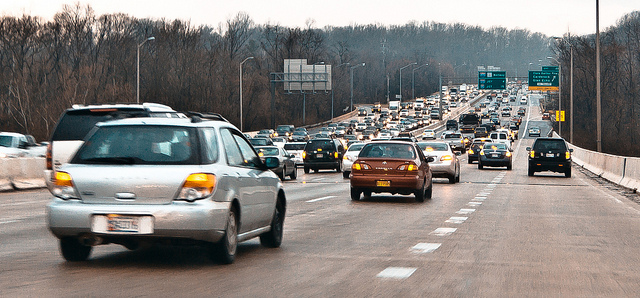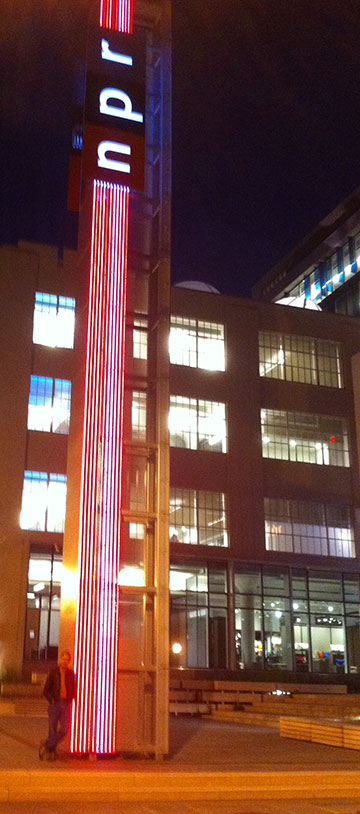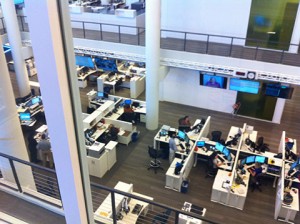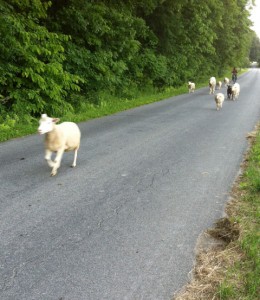Getting lost inside the beltway

DC beltway during evening rush hour. Photo: Ehpien. Some rights reserved.
I have literally been lost on the Washington, DC beltway–that multi-lane asphalt loop around our nation’s capital–for hours, unable to find the correct exit or get over to the left or right in time to make an exit.
The “beltway” is the common shorthand for the boundary around the peculiar environment known as our federal government.
I have made three trips to DC this fall and while all were work-related each had its own focus and purpose.
In September, our web manager Dale Hobson, membership director June Peoples and I went to NPR headquarters for an intensive training session on digital storytelling, with an emphasis on the use of photography. June came away with some fresh thinking about improving membership and outreach materials. Dale and I decided to partner on a long-term project focusing on local history through collaborations with libraries, historical associations and other community organizations. The plan is approach this undertaking on a town by town basis. More on this as planning and implementation go forward in 2014–and many of you will be hearing from us as we seek help from people across the region.
Earlier this month, I participated in the annual NPR-hosted “Weekend in Washington” as the guest of NCPR friend and NPR Foundation Board member Margot Ernst and her husband John. This is a three-day event designed to introduce new public radio friends to NPR staff and current projects. My takeaway from this event: people from all walks of life and all political persuasions care deeply about the work being done by public radio.
Finally, I just returned from a week in DC during which I attended a gathering of station representatives from across the country who had come together to grapple with some of the hairier challenges facing our industry. NPR also held its annual membership meeting (“members” being stations like NCPR).
The takeaway from the past week: collaboration will underpin much of our work in coming years. Collaboration between NPR and member stations, collaboration between NCPR and public media colleagues across the state and region, collaboration between NCPR and other commercial and non-commercial journalists (e.g., www.northcountrydaily.com), and, perhaps most importantly (see Dale and Ellen project mentioned above as an example), collaboration between NCPR and other non-profit organizations, community agencies, and other groups and individuals across our region.
All of these excursions were productive. But, you know what? I am so glad to be back on the other side of the beltway. Seems to me that we have less clutter on the landscape, that we’re less likely to lose our way about what matters and what doesn’t. We have a better vantage point for taking stock of what needs to be done…and doing it. It’s easy to lose one’s way inside the beltway. Hmm…maybe Congress needs to relocate to the north country…









.jpg)

I lived in MD for more than 15 of my 70+ years with half of that time spent in the employ of the DoD, and was occasionally forced, kicking and screaming, to attend meetings in and about the D.C. area. I can’t say I ever got lost but I did spend interminable lengths of time stop and go on the Beltway. Fortunately I was tipped off about the beauty of the Washington, DC Metrorail and seldom ventured closer to D.C. than the New Carrollton Metro station subsequent to.
Vehemently disagree that “…maybe Congress needs to relocate to the north country…”. In as NPR/NCPR occasionally air articles concerning the degradation of spaceship Earth at the hands of the 7+billion humans wrangling upon her, the majority of whom appear to be incapable of comprehending the necessity of restraint, I am at a loss to comprehend why NCPR is hell bent to encourage the capitalistic concept of “growth” as the holly grail to success.
” Seems to me that we have less clutter on the landscape”; mayhap an attempt at retaining that scenario would prove more valuable than bring in a gazillion folks to bolster the economic landscape for a privileged few.
Stay calm, Ken. Moving Congress to the north country was a metaphoric suggestion: a way of looking at the world from our perch that provides a special kind of clarity. When I go to NYC, I always leave my car an hour or so outside of the city and bus in. Then, I use the subway, which is so much faster and more efficient than driving around (and trying to park) in Manhattan. One of the real advantages of being in a big city is the public transportation network.
Listening to radio and podcasts, I’ve come to realize that the urban/rural divide is real in one important way: because there are so few of us compared to them we are written off as a statistical rounding error. If you want to attract the largest audience, the thinking goes, you cover topics from an urban standpoint, otherwise the majority of your listeners won’t be able to relate it to their own experience.
This attitude limits national news organizations to an outsider’s view of some of the major currents in the US today, most notably the Tea Party, but also to less reported stories like the increasing difficulty small town governments have in providing services to their residents or the anti-fracking movement.
NCPR fills this gap admirably and it’s great to hear Brian Mann on NPR from time to time. Even if I hear the unspoken byline in my mind, “Now, from parts unknown,…”
In the 60’s my dad was working temporarily in DC and my mom packed us kids into the station wagon and drove down to visit. He was working somewhere just off the Mall and my mother kept circling the Mall trying to find the address with little luck. After several circuits a cop who had noticed the same station wagon again and again waved her down and asked helpfully, “lady, which protest are you looking for?”